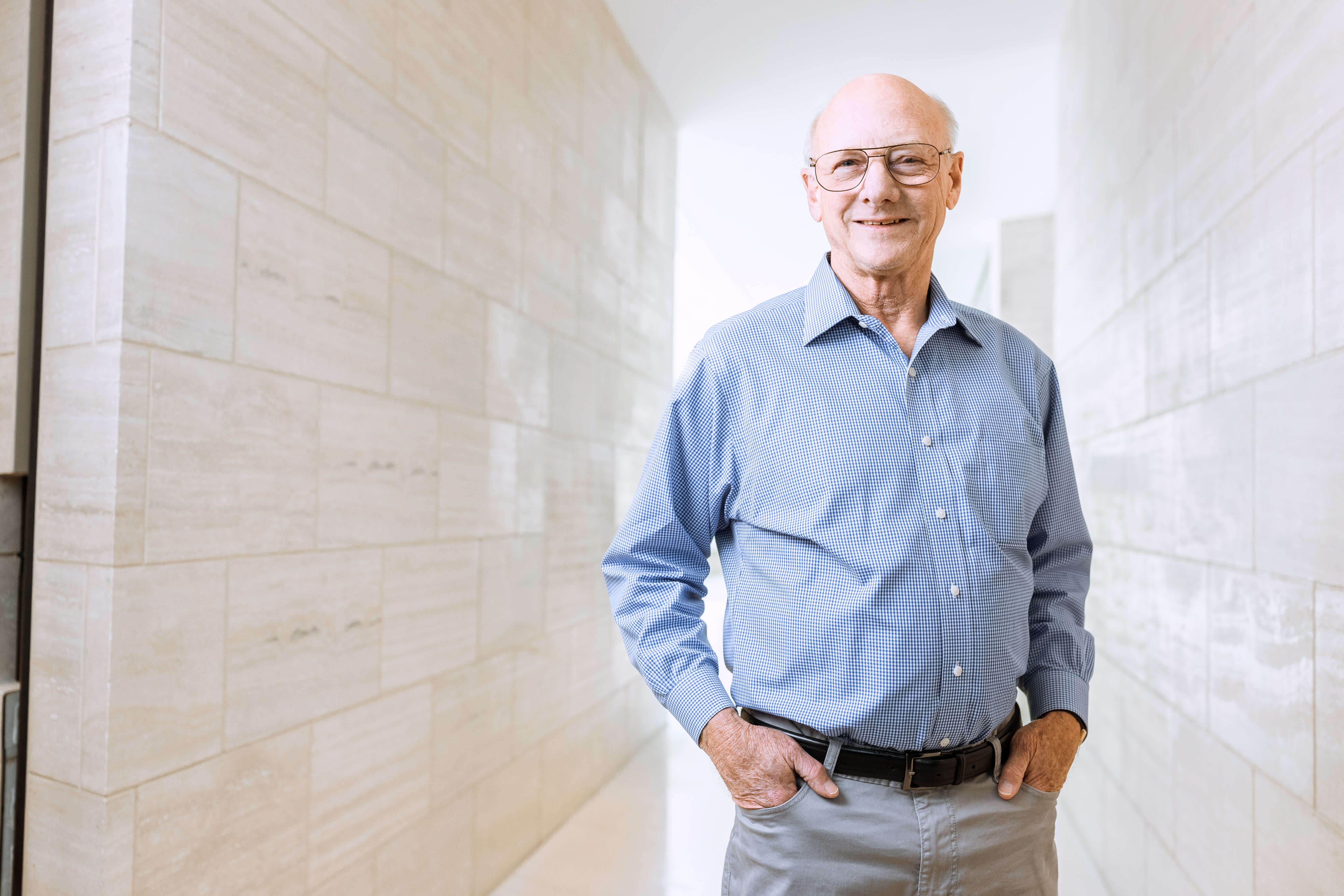BENZ LAB
Lab focus
Chris Benz was among the first to study why age is such an important risk factor for the development of breast cancer, the most common age-related malignancy. Breast cancer is especially prevalent among Marin County women, underscoring why he helped initiate the Marin Women’s Study (MWS) in 2006. Results from the MWS have since led to larger population-based studies and an exciting new breast cancer prevention project being undertaken at the Buck Institute.
Dr. Benz’s early career work explored the genetic and structural differences driving different types of breast cancers, followed by a comparison of these differences to the activated pathways driving other cancer types. This led to his national involvement in The Cancer Genome Atlas (TCGA) program in 2008, followed by a decade-long team collaboration between his lab and a group of very creative genomic and computer scientists at the University of California, Santa Cruz, supported by the National Cancer Institute. Over the past decade, their team’s accomplishments have earned international acclaim, most recently for leading an innovative international effort termed the Pan-Cancer Atlas project. This project molecularly characterized over 10,000 tumors across 33 different cancer types, producing a groundbreaking new understanding and classification of cancers that will enable better-informed clinical trials and more effective and personalized cancer treatments.
The Benz lab is also working to uncover a new subcellular mechanism altered during breast tumorigenesis that can be effectively targeted by existing and repurposed cancer drugs. The aim is to reverse the increased aggressiveness of cancer cells observed during metastatic progression and offer new hope to women struggling with more advanced stages of breast cancer.
Why it matters
Over the course of a lifetime, 1 in 8 women in the United States will develop breast cancer. It is the most common cancer among women worldwide. The risk of developing breast cancer dramatically increases after age 20, with 75 percent of all breast cancers arising after age 50. Yet, for unknown reasons, different molecular subtypes of breast cancer exhibit different age-specific patterns of incidence. We believe that understanding how aging increases the risk of developing each of the varying molecular subtypes of breast cancer will not only lead to novel prevention strategies and more sensitive and accurate early detection methods, but also uncover more effective and better tolerated treatments of breast cancer at all clinical stages, improving the outcomes and survival of younger and older women alike.
For women, aging is the single greatest risk factor for developing breast cancer. By understanding the different molecular and genetic subtypes of breast cancer and why aging affects the development of some but not others, new prevention strategies can be designed that will eliminate this deadly disease that primarily arises in women after age 50.
Chris Benz, MD
CENTER DETAILS
For over 40 years, Dr. Benz’s translational research efforts in medical oncology have focused on identifying molecular strategies to improve upon clinical cancer diagnostics and therapeutics. As one of the institute’s founding faculty members, Dr. Benz is currently the Elizabeth MA Stevens Professor of Cancer & Developmental Therapeutics at the Buck Institute, and also holds a joint professorship appointment at the University of California, San Francisco (UCSF) where he treats and cares for cancer patients at the UCSF Carol Franc Buck Breast Care Center while also contributing to nationwide clinical trial studies. In addition to publishing over 300 peer-reviewed lab research studies, Dr. Benz has served on multiple national and international review and oversight committees including the National Cancer Institute’s DTP/DCTD Biological Resources Branch Oversight Committee, the American Association of Cancer Research (AACR) Task Force on Cancer and Aging, and the national steering committees for the NCI/NHGRI-funded The Cancer Genome Atlas (TCGA) and Genome Data Analysis Network (GDAN) programs.
Years ago, Dr. Benz invented and then brought into worldwide clinical trials the first-in-human anti-HER2 cancer immunoliposome therapeutic, and for more than 12 years now has co-led the Buck Institute-UC Santa Cruz Genome Data Analysis Center serving the nationwide TCGA and GDAN programs. Dr. Benz’s numerous and groundbreaking Pan-Cancer Atlas publications have produced a new molecular understanding and classification of human cancers leading to more personalized and effective clinical cancer treatment, earning him a 2020 AACR Team Science Award, and enhancing the global stature of the Buck Institute.
-
 LaNicia Ellis Dominican Student
LaNicia Ellis Dominican Studentlellis@buckinstitute.org
-
 Mikayla Hady Postbacc
Mikayla Hady PostbaccMikayla is a postbacc for the Benz and Ellerby labs. She received a bachelor's degree in biochemistry and molecular biology with a minor in neuroscience from the University of Wisconsin- Eau Claire. While not in the lab, she enjoys running, reading, and cooking.
MHady@buckinstitute.org
-
 Gary Scott Senior Staff Scientist
Gary Scott Senior Staff ScientistGary has enjoyed pursuing science in the Benz lab for many years where the focus has been to translate basic molecular insights into therapeutic applications. Investigations examining the estrogen receptor, a key regulator not only of a normal woman’s health but a driver of many breast cancers, resulted in identifying sites on the estrogen receptor indicative of its activation status. Studies exploring another key player in breast cancer, the ERBB2 receptor, produced numerous insights into how the stability of its messenger RNA is influenced by different cancer therapeutic agents. Currently, using a small molecular that activates the mitochondria and is also capable of passing the blood-brain barrier, is being explored for its potential therapeutic value in treating neurodegenerative diseases which most commonly afflict the aging population.
GScott@buckinstitute.org
-
 Desi Stoyanova Research Associate
Desi Stoyanova Research AssociateDesi holds a Bachelor's degree from Smith College with a major in biological sciences and a minor in government. Prior to joining the Benz lab, she worked as an associate scientist in production for the company DiaCarta Inc. Outside the lab, Desi enjoys working out, going to the beach, and reading.
DStoyanova@buckinstitute.org
-
 Christina Yau, PhD Senior Staff Scientist
Christina Yau, PhD Senior Staff ScientistCYau@buckinstitute.org
Selected Publications
- Hoadley, K. A., et al., including Benz, C. C. (2014 Aug 14). Multiplatform analysis of 12 cancer types reveals molecular classification within and across tissues of origin. Cell, 158, 929–944. DOI: 10.1016/j.cell.2014.06.049. PubMed PMID: 25109877.
- Hoadley, K. A., et al., including Benz, C. C. (2018 Apr 5). Cell-of-origin patterns dominate the molecular classification of 10,000 tumors from 33 types of cancer. Cell, 173, 291–304. DOI: 10.1016/j.cell.2018.03.022. PubMed PMID: 29625048.
- Scott, G. K., Chu, D., Kaur, R., Malato, J., Rothschild, D. E., Frazier, K., Eppenberger-Castori, S., Hann, B., Park, B. L., Benz, C. C. (2016 Oct 18). ERpS294 is a biomarker of ligand or mutational ER activation and a breast cancer target for CDK2 inhibition. Oncotarget. DOI: 10.18632/oncotarget.12735. PubMed PMID: 27765908.
- Prebil, L. A., Ereman, R. R., Powell, M. J., Kerlikowske, K., Shepherd, J. A., Hurlbert, M. S., Benz, C. C. (2014 Jul). First pregnancy events and future breast density: Modification by age at first pregnancy and specific VEGF and IGF1R gene variants. Cancer Causes and Control, 25, 859–868. DOI: 10.1007/s10552-014-0386-2. PubMed PMID: 24801045.
- Powell, M. J., Von Behren, J., Neuhausen, S., Reynolds, P., Benz, C. C. (2017 Oct). Functional IGF1R variant predicts breast cancer risk in women with preeclampsia in California Teachers Study. Cancer Causes and Control, 28, 1027–1032. DOI: 10.1007/s10552-017-0942-7. PubMed PMID: 28822014.
Dr. Benz’s NCBI Bibliography link






